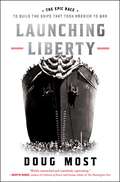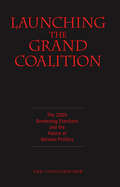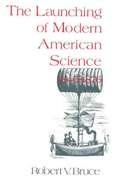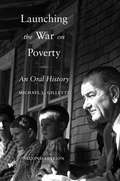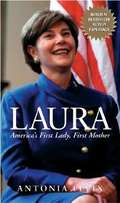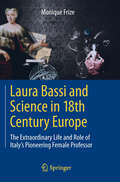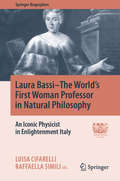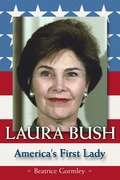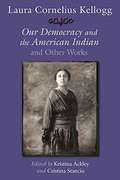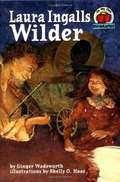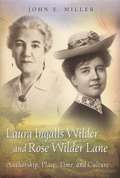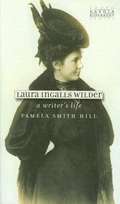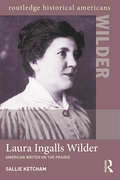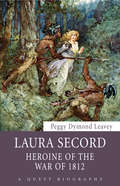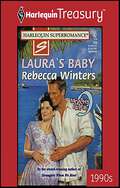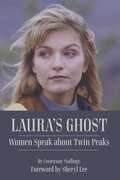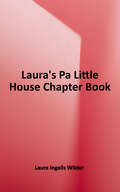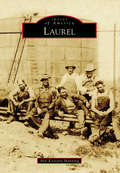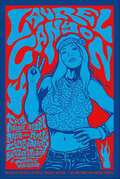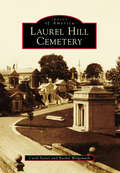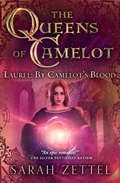- Table View
- List View
Launching Liberty: The Epic Race to Build the Ships That Took America to War
by Doug MostOut of nothing but the government&’s behest, a few bold men conjured a giant ship-building industry in 1940 and launched the ships that took America to war and to victory.In 1940, the shadow of war loomed large over American life. President Roosevelt understood that it wasn&’t a matter of if the United States would be pulled into battle, but when. He foresaw a &“new kind of war,&” one that hinged on efforts at home. Long before the attack on Pearl Harbor, German U-boats were relentlessly attacking American vessels, prompting Roosevelt to launch a monumental ship-building campaign. He knew that no matter how much weaponry and how many tanks, planes and trucks America built, the &“Arsenal of Democracy&” would be useless unless it could be brought in massive volume, and at breakneck speed, to troops fighting overseas. Launching Liberty tells the remarkable story of how FDR partnered with private businessmen to begin the production of cargo freighters longer than a football field—ships he affectionately dubbed &“ugly ducklings.&” These colossal Liberty Ships took over six months to build at the start of his $350 million emergency shipbuilding program, far too long. The government turned to Henry Kaiser, the man who had delivered the Boulder Dam ahead of schedule and under budget, but had never built a ship in his life. Kaiser established a network of shipyards from coast to coast and recruited tens of thousands of workers eager to contribute to the war effort. Many, particularly African Americans and women, traveled from some of the most downtrodden, rural parts of the nation to help their country and to find a better life of greater equality. As German U-boats maintained their pace of attack, Roosevelt and Kaiser initiated a bold, nationwide competition among shipyards to see who could construct ships the fastest. Driven by duty and the thrill of innovation, workers reduced the shipbuilding timeline from months to weeks and then to days. Launching Liberty is a tapestry of voices reflecting the diverse American experience of World War II. From the halls of the White House to the cramped quarters of half-finished cargo ships, we hear from naval architects, welders, nurses, engineers, daycare providers, and mothers balancing family life with the demands of wartime economy. This book uncovers the inspiring, untold stories of those who rose to the challenge during one of America&’s most tumultuous times.
Launching The Grand Coalition: The 2005 Bundestag Election and the Future of German Politics
by Eric LangenbacherThis edited volume, which brings together the leading experts in German politics from around the US and Germany, combines rich descriptive data with insightful analyses regarding one of the most dramatic and important election years in postwar Germany. A variety of more specialized issues and perspectives is addressed, including the transatlantic relationship, EU policy, voting behavior and far Right parties. This book will be essential reading for students of German, European and comparative politics.
Launching the War on Poverty: An Oral History , 2nd Edition
by Michael L. GilletteHead Start, Job Corps, Foster Grandparents, College Work-Study, VISTA, Community Action, and the Legal Services Corporation are familiar programs, but their tumultuous beginning has been largely forgotten. Conceived amid the daring idealism of the 1960s, these programs originated as weapons in Lyndon Johnson's War on Poverty, an offensive spearheaded by a controversial new government agency. Within months, the Office of Economic Opportunity created an array of unconventional initiatives that empowered the poor, challenged the established order, and ultimately transformed the nation's attitudes.
Laura America's First Lady, First Mother
by Antonia FelixThis is a biography of the First Lady Laura Bush. There notes and references in the back.
Laura Bassi and Science in 18th Century Europe: The Extraordinary Life and Role of Italy's Pioneering Female Professor
by Monique FrizeThis book presents the extraordinary story of a Bolognese woman of the settecento. Laura Maria Caterina Bassi (1711-1778) defended 49 Theses at the University of Bologna on April 17, 1732 and was awarded a doctoral degree on May 12 of the same year. Three weeks before her defense, she was made a member of the Academy of Sciences in Bologna. On June 27 she defended 12 additional Theses. Several of the 61 Theses were on physics and other science topics. Laura was drawn by the philosophy of Newton at a time when most scientists in Europe were still focused on Descartes and Galen. This last set of Theses was to encourage the University of Bologna to provide a lectureship to Laura, which they did on October 29, 1732. Although quite famous in her day, Laura Bassi is unfortunately not remembered much today. This book presents Bassi within the context of the century when she lived and worked, an era where no women could attend university anywhere in the world, and even less become a professor or a member of an academy. Laura was appointed to the Chair of experimental physics in 1776 until her death. Her story is an amazing one. Laura was a mother, a wife and a good scientist for over 30 years. She made the transition from the old science to the new very early on in her career. Her work was centered on real problems that the City of Bologna needed to solve. It was an exciting time of discovery and she was at the edge of it all the way.
Laura Bassi–The World's First Woman Professor in Natural Philosophy: An Iconic Physicist in Enlightenment Italy (Springer Biographies)
by Luisa Cifarelli Raffaella SimiliThis book provides a fascinating insight into the life and scientific work of Laura Bassi, the first female member of the influential Academy of Sciences of the Institute of Bologna and also the first woman to be appointed a university professor in physics, or universal philosophy as it was then termed. The book describes Laura Bassi’s research activities and achievements, explaining the influence of Newton, her role in promoting Newtonian experimental physics in Bologna, and her work as an experimentalist, including on electricity. Much attention is paid to the context in which Bassi developed her career. The very considerable difficulties faced by a woman surrounded by male university teachers and members of the Academy are discussed, casting light on the constraints that led Bassi to set up the first experimental physics laboratory in her home, complete with the many instruments required for experimentation and private teaching. The aim is to provide a rounded and well-documented account of the scientific endeavors and achievements of a too often overlooked scientist who struggled to overcome the prejudices of her age.
Laura Blundy
by Julie MyersonLondon, mid-1800s: On a thundery afternoon, pursuing an obsession, Laura murders the man who saved her life--her husband.
Laura Cornelius Kellogg: Our Democracy And The American Indian And Other Works (The Iroquois And Their Neighbors)
by Kristina Ackley Cristina StanciuLaura Cornelius Kellogg was an eloquent and fierce voice in early twentieth century Native American affairs. An organizer, author, playwright, performer, and linguist, Kellogg worked tirelessly for Wisconsin Oneida cultural self-determination when efforts to Americanize Native people reached their peak. She is best known for her extraordinary book Our Democracy and the American Indian (1920) and as a founding member of the Society of American Indians. In an era of government policies aimed at assimilating Indian peoples and erasing tribal identities, Kellogg supported a transition from federal paternalism to self-government. She strongly advocated for the restoration of tribal lands, which she considered vital for keeping Native nations together and for obtaining economic security and political autonomy. <p><p> Although Kellogg was a controversial figure, alternately criticized and championed by her contemporaries, her work has endured in Oneida community memory and among scholars in Native American studies, though it has not been available to a broader audience. Ackley and Stanciu resurrect her legacy in this comprehensive volume, which includes Kellogg’s writings, speeches, photographs, congressional testimonies, and coverage in national and international newspapers of the time. In an illuminating and richly detailed introduction, the editors show how Kellogg’s prescient thinking makes her one of the most compelling Native intellectuals of her time.
Laura Ingalls Wilder
by Ginger WadsworthExamines Laura Ingalls Wilder's life as a pioneer girl and her work as a writer describing that life for others.
Laura Ingalls Wilder and Rose Wilder Lane: Authorship, Place, Time, and Culture
by John E. Miller"The mother-daughter partnership that produced the Little House books has fascinated scholars and readers alike. Now, John E. Miller, one of America's leading authorities on Laura Ingalls Wilder and Rose Wilder Lane, combines analyses of both women to explore this collaborative process and shows how their books reflect the authors' distinctive views of place, time, and culture. Along the way, he addresses the two most controversial issues for Wilder/Lane aficionados: how much did Lane actually contribute to the writing of the Little House books, and what was Wilder's real attitude toward American Indians. Interpreting these writers in their larger historical and cultural contexts, Miller reconsiders their formidable artistic, political, and literary contributions to American cultural life in the 1930s. He looks at what was happening in 1932 - from depression conditions and politics to chain stores and celebrity culture - to shed light on Wilder's life, and he shows how actual "little houses" established ideas of home that resonated emotionally for both writers." "In considering each woman's ties to history, Miller compares Wilder with Frederick Jackson Turner as a frontier mythmaker and examines Lane's unpublished history of Missouri in the context of a contemporaneous project, Thomas Hart Benton's famous Jefferson City mural. He also looks at Wilder's Missouri Ruralist columns to assess her pre-Little House values and writing skills, and he readdresses her literary treatment of Native Americans. A final chapter shows how Wilder's and Lane's conservative political views found expression in their work, separating Lane's more libertarian bent from Wilder's focus on writing moralist children's fiction." "These nine thoughtful essays expand the critical discussion on Wilder and Lane beyond the Little House. Miller portrays them as impassioned and dedicated writers who were deeply involved in the historical changes and political challenges of their times - and contends that questions over the books' authorship do not do justice to either woman's creative investment in the series. Miller demystifies the aura of nostalgia that often prevents modern readers from seeing Wilder as a real-life woman, and he depicts Lane as a kindred artistic spirit, helping readers better understand mother and daughter as both women and authors."--BOOK JACKET.
Laura Ingalls Wilder: A Biography
by William Anderson(back of book) The Little House series introduced millions of readers to the beloved world of Laura Ingalls Wilder. From her very young days on the prairie to her golden years with her husband, Almanzo, Laura has become a friend to all who read her classic books. Here, noted Wilder historian William Anderson takes a fresh look at Laura in the days of her youth, and gives a detailed account of the events her cherished books describe. In these pages we learn what historic events inspired Laura to write her stories and what happens to her after the last Little House book ends. This book is sure to satisfy the most curious fans who long to know even more about Laura's adventurous pioneer life!
Laura Ingalls Wilder: A Writer's Life
by Pamela Smith Hill(abbreviated from back of book) Pamela Smith Hill delves into the complex and often fascinating relationships Wilder formed throughout her life that led to the writing of her classic Little House series. Using Wilder's stories. Hill has produced a historical-literary biography of the famous and much- loved author. Fol ... Hill provides a context, both familial and literary, for Wilder's writing career. (Hill studies).. the relationship with her daughter - the hidden editor - Rose Wilder Lane. Wilder produced her timeless classics with the help of her daughter's editorial insights. Hill argues that they differed in their visions of the path Wilder's career should follow, but eventually Lane's editing brought out the best of her mother's writing and allowed her creativity, expression, and experiences to shine through.
Laura Ingalls Wilder: American Writer on the Prairie (Routledge Historical Americans)
by Sallie KetchamLaura Ingalls Wilder wrote stories that have defined the American frontier for generations of readers. As both author and character in her own books, she became one of the most famous figures in American children’s literature. Her famous Little House on the Prairie series, based on her childhood in Wisconsin, Kansas, Minnesota, and South Dakota, blended memoir and fiction into a vivid depiction of nineteenth-century settler life that continues to shape many Americans’ understanding of the country’s past. Poised between fiction and fact, literature and history, Wilder’s life is a fascinating window on the American West. Placing Wilder’s life and work in historical context, and including previously unpublished material from the Wilder archives, Sallie Ketcham introduces students to domestic frontier life, the conflict between Native Americans and infringing white populations, and the West in public memory and imagination.
Laura Ingalls Wilder: Growing Up in the Little House (Women of Our Time)
by Patricia Reilly GiffA biography of the author of the "Little House" books, including the years of her marriage to Almanzo Wilder.
Laura Ingalls Wilder: Young Pioneer (Childhood of Famous Americans Series)
by Beatrice GormleyThis fictionalized biography of the author of the popular "Little House" books tells her family's real life on the American frontier, and of the events that surpassed the drama of her stories.
Laura Secord: Heroine of the War of 1812
by Peggy Dymond Leavey2013 Speaker’s Book Award — Shortlisted Laura Secord is now famous for her singular feat of bravery during the War of 1812, but did she warn the British and help defeat the American invaders as her legend says? After dragging her injured husband off the battlefield during the War of 1812, Laura Secord (1775-1868) was forced to house American soldiers for financial support while she nursed him back to health. It was during this time that she overheard the American plan to ambush British troops at Beaver Dams. Through an outstanding act of perseverance and courage in 1813, Laura walked an astonishing 30 kilometers from her home to a British outpost to warn Lieutenant James FitzGibbon. Despite facing rough terrain, the ever-present danger of being caught by American troops, and rather delicate encounters with Native forces, Laura reached FitzGibbon just in time for the British to prepare and execute an ambush on American military nearby, forcing the U.S. general to surrender. Laura lived a very long time, dying at the age of 93. In her lifetime the government never formally recognized her singular feat of bravery, and much controversy still envelopes her legacy.
Laura's Baby (9 Months Later)
by Rebecca Winters9 Months LaterBy the award-winning author of Strangers When We MeetLaura Donetti knows two things: Her marriage to Tony Donetti is over. And she's having his baby.Zach Wilde first meets Laura while Tony is off seducing another woman. Zach is disgusted with Donetti. And protective of Laura. He also feels something he'd never expected to feel again. Attraction. Desire. For Laura, who's another man's wife. Laura, who's pregnant.Laura, who needs his help. And wants his love....
Laura's Ghost: Women Speak About Twin Peaks
by Courtenay StallingsThis incredibly powerful book by media professor Courtenay Stallings explores the dark side of Twin Peaks through interviews with fans of the show who've experienced trauma in their own lives and worked through it with assistance from the character of Laura Palmer. In 1990, the groundbreaking television series Twin Peaks, cocreated by David Lynch and Mark Frost, opened with a murder mystery when a homecoming queen washed up on a rocky beach. Laura Palmer&’s character began as a plot device that triggered a small town to face its fractured self. After three seasons and a film, Laura Palmer is no longer just a plot device. Twin Peaks allows the audience to get to know the victim—a complex woman finding her strength while enduring incredible trauma. Laura&’s Ghost: Women Speak about Twin Peaks explores Laura&’s legacy through the perspectives of women in the fan community and women involved in the show. Actor Sheryl Lee examines the challenges of playing Laura Palmer. Filmmaker Jennifer Lynch discusses writing Laura&’s backstory in The Secret Diary of Laura Palmer. Grace Zabriskie argues about the complicity of Sarah Palmer, Laura&’s mother. Sabrina S. Sutherland, executive producer of Twin Peaks, talks about Laura&’s legacy. Women in the Twin Peaks fan community share their powerful and heart-wrenching stories of survival and what Laura Palmer means to them. This book is a reckoning in which women speak about trauma, mischief, humor, sexuality, strength, weakness, wickedness, and survival.
Laura's Pa (Little House Chapter Books #12)
by Laura Ingalls WilderStories about Laura's father and life on the frontier.
Laurel
by Ann Kooistra-ManningEarly Laurel, like many Montana frontier towns, was shaped by tenacious settlers who struggled to carve a living from a harsh, often unforgiving landscape in the wake of the Indian Wars. Laurel started as little more than a railway station and a handful of businesses serving railroad workers, farmers, and ranchers in the early 1880s. Irrigation projects soon transformed the dry, dusty prairies along the Yellowstone River near Laurel into productive farmlands. Homesteaders flocked to the valley. By 1908, Laurel had grown into a bustling shipping and servicing center for three major railroads and boasted the largest rail yard and roundhouse between Seattle and St. Paul. In the 1920s, it became a jumping-off point for tourists destined for Yellowstone Park. A decade later, Laurel staked its claim in the region's emerging oil industry when the Laurel Leaf refinery was built. This small, unassuming town has played a vital role in the development of the Yellowstone River Valley and beyond.
Laurel Canyon: The Inside Story of Rock-and-Roll's Legendary Neighborhood
by Michael WalkerA “richly anecdotal” account of the secluded LA neighborhood’s legendary music scene, a tale of groupies, cocaine, and California dreaming (Salon).Finalist, SCBA Book Award for NonfictionA Los Angeles Times BestsellerIn the late sixties and early seventies, an impromptu collection of musicians colonized a eucalyptus-scented canyon deep in the Hollywood Hills of Los Angeles and melded folk, rock, and savvy American pop into a sound that conquered the world as thoroughly as the songs of the Beatles and the Rolling Stones had before them. Decades later, the music made in Laurel Canyon continues to pour from radios, earbuds, and concert stages around the world.In Laurel Canyon, veteran journalist Michael Walker draws on interviews with those who were there to tell the inside story of this unprecedented gathering of some of the era’s leading musical lights—including Joni Mitchell; Jim Morrison; Crosby, Stills, and Nash; John Mayall; the Mamas and the Papas; Carole King; the Eagles; and Frank Zappa, to name just a few—who turned Los Angeles into the music capital of the world and forever changed the way popular music is recorded, marketed, and consumed.“An exhaustively researched and richly anecdotal book that will fascinate both rock aficionados and cultural historians.” —Salon“Captures all the magic and lyricism of an almost mythological geographical spot in the history of pop music . . . the story of a more melodious time in rock and roll where the great talents of the ‘60s and ‘70s cloistered together in a sort of enchanted valley populated by an all-star cast of characters.” —Steven Gaines, author of Philistines at the Hedgerow
Laurel Hill Cemetery
by Carol Yaster Rachel WolgemuthEstablished in 1836, Philadelphia’s Laurel Hill Cemetery was one of the earliest rural cemeteries in America. The picturesque views and outstanding horticulture, along with sculptures and monuments designed by notable artists and architects—like Alexander Milne Calder, Alexander Stirling Calder, Harriet Frishmuth, John Notman, and Thomas Ustick Walter—attracted thousands of visitors. Laurel Hill became the desired place of burial for Philadelphia’s elite and the final resting place for those with last names like Widener, Wharton, Meade, and Elkins. The cemetery’s design was much admired and widely imitated, both locally and nationally. While the 20th century ushered in a steep decline for Laurel Hill, the establishment of a friends group in 1978 and the cemetery’s designation as a National Historic Landmark in 1998 signaled a transformation for the cemetery. Laurel Hill entered a new century as a revitalized and relevant institution. Once again, the cemetery is regarded as an important part of the community, a worthy destination for visitors, and a place to share in the stories of the men and women whose lives shaped both Philadelphia and the nation.
Laurel: By Camelot's Blood (The Queens of Camelot #4)
by Sarah ZettelA powerful queen and an Arthurian knight risk their lives and love for their kingdoms in this romantic fantasy from an award-winning author. Romance and Arthurian legend combine in this epic series featuring the women of Camelot. In order to provide protection and stability for her fractious kingdom, Laurel Carnbrea, queen of Cambryn, must marry Sir Agravain, knight of the Round Table and nephew of King Arthur, a man she has never met and about whom she knows nothing. But Laurel is determined to keep her people united, even if it means marrying a man widely believed to be heartless. Famously acerbic and impatient, Agravain finds much to admire in his new wife&’s courage, sense, and beauty. And to his surprise, finds himself opening his sealed heart to her bravery and warmth. But Lynet and Agravain are given no time to come together. Agravain&’s homeland of Gododdin is in peril. His father, the mad King Lot, is dying, and the foul sorceress Morgaine prepares to invade. Summoning her family&’s magical power, Laurel readies herself for battle alongside her new husband. But as she prepares to stand against the darkest evil, Lynet&’s secrets may doom her, and the man she&’s beginning to love . . . Praise for the Queens of Camelot series &“A real happy ending takes love, effort, and sacrifice. Pick up a copy of Camelot&’s Blood if you want an epic romance!&” —Silver Petticoat Reviews on Laurel: Camelot&’s Blood &“This novel delivers passion, danger, and excitement laced with fantasy.&” —RT Book Reviews on Risa: In Camelot&’s Shadow &“A spellbinding journey.&” —BookLoons Reviews on Elen: For Camelot&’s Honor
